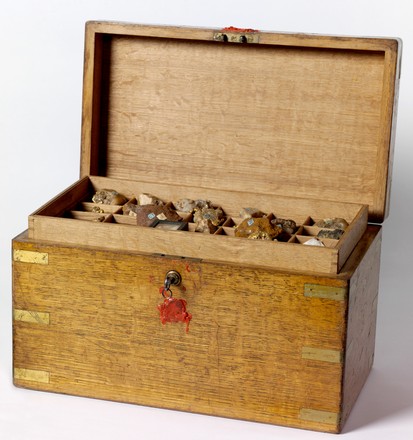
Gold chest
belonging to Thomas Livingstone Mitchell, c1851–55
Wooden chest with brass fittings, containing 46 mineral specimens in four trays
Bequest of Sir William Dixson, 1952
DR 157
Wooden chest with brass fittings, containing 46 mineral specimens in four trays
Bequest of Sir William Dixson, 1952
DR 157
During the winter of 1851, the NSW surveyor-general Thomas Livingstone Mitchell travelled west to survey the recently discovered goldfields around Bathurst. At the makeshift tent settlement of Ophir on the Summerhill Creek, he planned the streets and allotments for a township. He also collected a fine quartz specimen, which he catalogued and carefully stored in this wooden chest, along with other specimens collected from his various expeditions around NSW.
Inside the wooden chest are four specimen trays, three of which can be removed. These originally held 48 specimens (two are now missing), mostly quartz, varying in colour, shape and texture. Most have light concentrations of gold; a few have heavier concentrations. The chest also contains specimens of gold dust.


 Back to list
Back to list